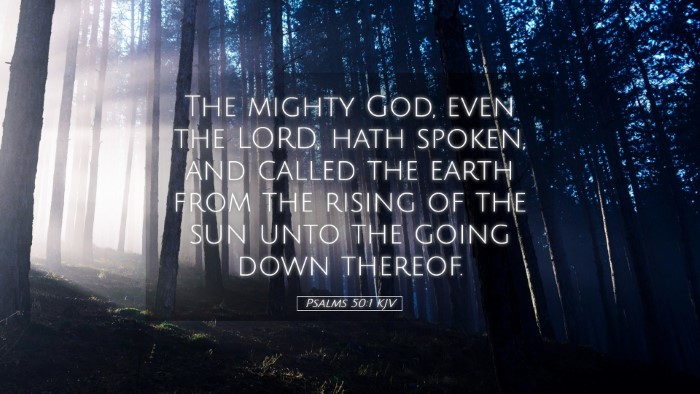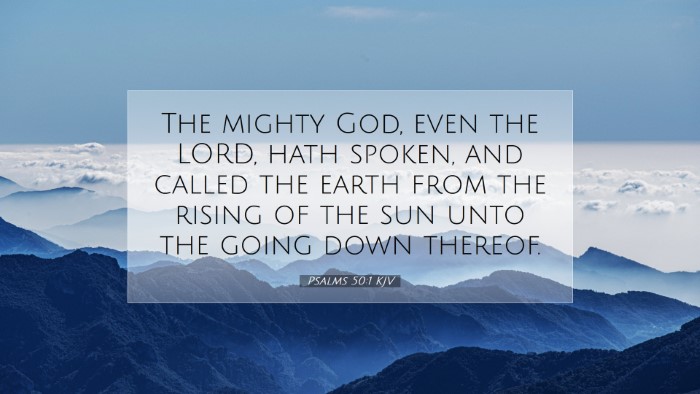Commentary on Psalms 50:1
Psalms 50:1: "The mighty God, even the LORD, hath spoken, and called the earth from the rising of the sun unto the going down thereof."
Introduction
The opening verse of Psalm 50 is a profound declaration concerning the sovereignty and majesty of God. It serves as an introduction to the themes of divine judgment, the nature of true worship, and God’s relationship with His creation. This commentary integrates insights from revered public domain sources to explore the rich theological implications of this verse.
The Authority of God
Matthew Henry emphasizes that God's authority is not only mighty but universal. He writes, “The mighty God, even the Lord,” which indicates the supremacy of God over all creation. He stands as the creator and sustainer of the universe, whose voice commands all of existence. This attribute highlights that no aspect of life escapes His scrutiny or control.
The Divine Call
Albert Barnes reflects on the phrase “hath spoken, and called the earth,” suggesting that God’s utterance reaches every corner of the earth. This call is not merely an invitation but an authoritative summons. All creation, from the rising of the sun in the east to its setting in the west, is encompassed in this divine proclamation. Barnes notes that this universal call signifies the vastness of God’s power and presence.
The Earth Responds
Adam Clarke offers a profound insight into the notion that “the earth” symbolizes all the inhabitants upon it. This includes not just the physical land but also all people. God desires a response from His creation, embodying both accountability and the expectation of worship. Clarke further elaborates that this passage outlines the scope of divine communication—God does not limit His call to a select few but extends it universally.
Theological Implications
-
God’s Sovereignty:
God's might and authority establish Him as the ultimate ruler over the cosmos, assuring believers that He reigns supreme regardless of earthly circumstances.
-
Universal Accountability:
Every individual on Earth is accountable to God, reinforcing the doctrine of individual responsibility in responding to divine revelation.
-
The Nature of Worship:
This verse hints at the implications for worship, suggesting that genuine worship encompasses an awareness of God’s majesty and our response to His call.
Cultural Context
In the historical context of ancient Israel, the Psalm was likely written during a time when idolatry and false worship were prevalent. God’s reminder of His might serves as a warning against such practices. The psalmist's proclamation aims to redirect the focus of the people back toward genuine worship that acknowledges God’s sovereignty.
Practical Applications
-
Personal Reflection:
Believers are called to examine their lives in light of God’s majesty, ensuring that their worship is sincere and reflective of a true relationship with Him.
-
Communal Worship:
This verse should inspire congregations to gather and respond collectively to God’s call, affirming His greatness through worship and testimony.
-
Evangelism:
The universal nature of God's call implies a mandate for believers to share the Gospel, as all people are part of His creation and included in His divine purposes.
Conclusion
Psalm 50:1 encapsulates a powerful summons to recognize the mighty God who commands the entirety of creation. As interpreted through public domain commentaries, this verse invites believers to embrace their responsibility to respond to God’s call. It challenges pastors, students, theologians, and scholars to delve deeper into the understanding of God's sovereignty and our role in worship. Ultimately, the verse calls for a recognition of the Creator's magnificence and the imperative of authentic devotion.


